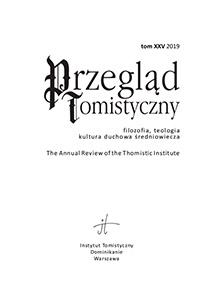MICHAŁ MROZEK OP, The Main Meanings of the Word “sapientia” in the Moral Part of the “Summa Theologiae” by St. Thomas Aquinas

Volume XXV: 2019
Philosophy — Theology — Spiritual culture of the Middle Ages
ISSN 0860-0015
e-ISSN 2544-1000
SUMMARY
This article presents the main meanings of the word ‘sapientia’ in the Secunda Pars of Summa Theologiae and their mutual proportions.
The starting point is the search results using the Index Thomisticus letter for the term ‘sapien’. This provides 1,083 results within Summa Theologiae, with nearly 80 percent of these results being the noun sapientia. Other results are words closely related to wisdom, mainly the participle sapiens and adjectives and adverbs, sometimes graduated. The search was then narrowed down to the Secunda Pars to focus on the role of wisdom in moral theology regarding human life, as distinct from wisdom referred to God and to Christ (Prima and Tertia Pars).
This leads to 18 questions within the Secunda Pars, where Thomas uses this term most frequently. Together, these questions bring together as much as 60.7 percent of the wisdom references at Secunda Pars, which is 38.3 percent of all references in the entire Summa Theologia.
Analysis of these questions allows us to accurately present the main meanings of the word ‘wisdom’ that can be distinguished within the Secunda Pars, and in what proportions they remain relative to each other.
Among the main meanings, two come to the fore: wisdom as an intellectual virtue, and wisdom as a gift of the Holy Spirit. Both meanings have a separate context and a network of references, also within the moral considerations of Summa Theologiae. In terms of the gifts of the Holy Spirit, we have the theological interpretation from Isaiah 11.2-3; where it is worth emphasizing the significant contribution of St. Augustine and St. Gregory the Great. However, intellectual virtues come from classical Greek philosophy. The most thorough analysis can be found in the sixth book of Aristotle’s Nicomachean Ethics. In addition, wisdom appears in an additional sense as a charism (sermo sapientiae).
The method adopted in the article also helps to capture the proportions of these meanings in relation to each other. Wisdom as a gift of the Holy Spirit dominates and constitutes as much as 60% of all places within 18 distinguished questions. As an intellectual virtue, wisdom occurs in 17% of these references; as a 5% charism. Other or combined meanings of wisdom are 18%.
A thorough analysis of the main meanings of wisdom in the Secunda Pars confirms Thomas’s awareness of both the different meanings of the word and the different traditions from which they originate. Sometimes. St Thomas underlines these differences, especially in those cases where there is a risk of them being misinterpreted. Finally, it is noteworthy that, when writing about wisdom, Aquinas more frequently uses the meaning connected to it being a gift of the Holy Spirit rather than an intellectual virtue, even if the moral part of Summa Theologiae is largely an ongoing dialogue with Aristotle and his Nicomachean Ethics.
